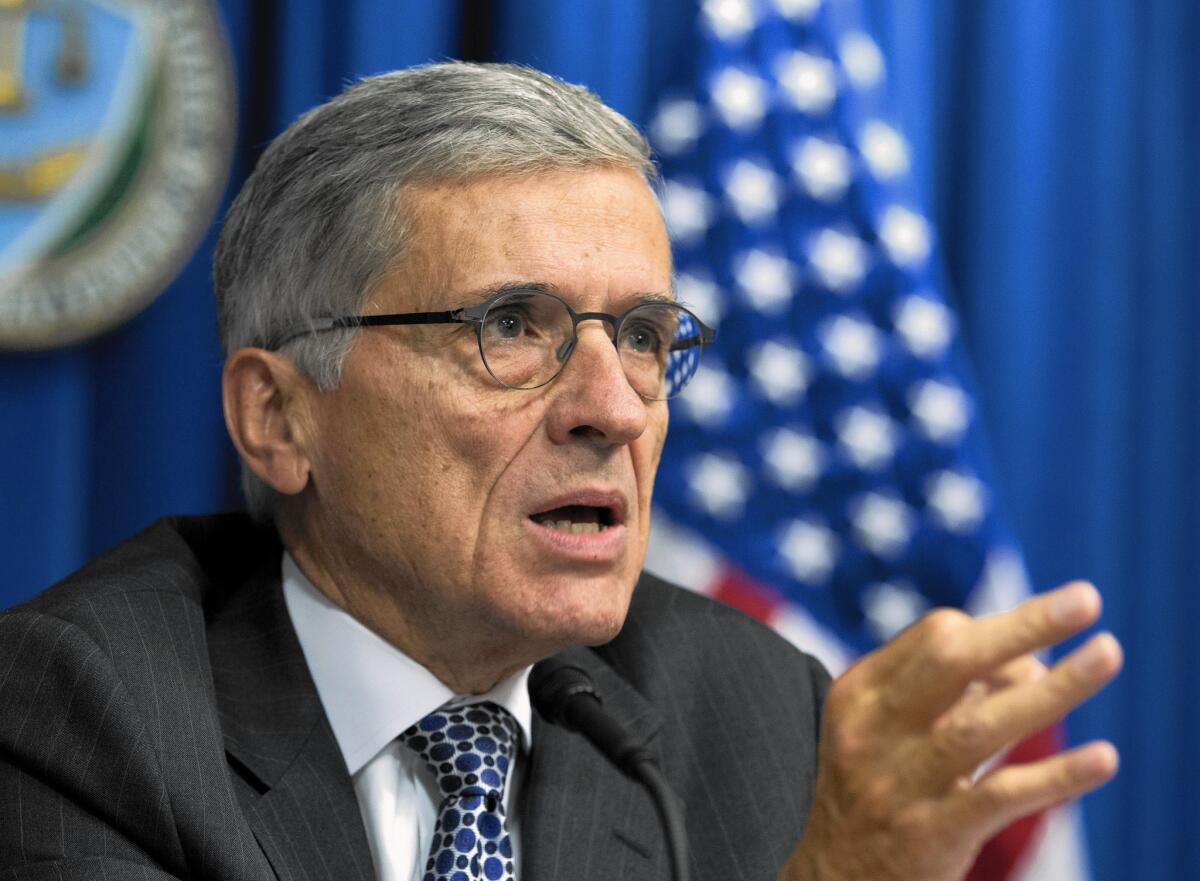House Republicans slam FCC net neutrality proposal, tout own bill

Reporting from washington â House Republicans warned that tough new regulations for online traffic, expected to be adopted Thursday, risk years of legal uncertainty and argued that the GOPâs more restrained legislation was the best way to protect the Internet.
Rep. Joe L. Barton (R-Texas) called the proposed rules by Federal Communications Commission Chairman Tom Wheeler ânet nonsenseâ and predicted that they would be struck down again by federal judges.
âItâs not going to work,â Barton said at a House Energy and Commerce subcommittee hearing Wednesday. âIt is going to be tested in court and itâs going to fail in court.â
Telecom companies twice before have won court orders blocking so-called net neutrality rules, largely on grounds that the FCC had overstepped its authority. The industry has vowed to sue again should the Democratic-controlled agency adopt Wheelerâs proposal Thursday.
The FCC is taking a different and more controversial approach this time that is meant to withstand a legal challenge, but a lawsuit still could take three or more years to be resolved, experts said.
That has both sides worried. Some critics at the hearing said the lengthy legal battle could harm investment in broadband networks. Supporters said net neutrality protections would be at risk if a court tossed them out at a time beyond the 2016 election when the FCC could be controlled by Republicans.
âIâm concerned that if Congress does not act, all protection for network neutrality is at risk of being lost,â said Rick Boucher, a former Democratic congressman from Virginia who now chairs the Internet Industry Alliance, a telecom industry trade group.
Wheeler has proposed such rules as prohibiting broadband providers from charging websites for faster delivery of their content. But enforcing those rules depends on classifying broadband Internet service as a more highly regulated service under Title 2 of the telecommunications law.
The proposal would put broadband in the same utility-like legal category as conventional phone companies, reversing an FCC decision in 2002 that classified broadband as a more lightly regulated information service.
But the move would address a key problem in the last court ruling, in January 2014. Federal judges said then that the FCC overstepped its authority by trying to treat Internet service providers as utilities without classifying them that way.
Republicans, who oppose Wheelerâs approach, said their legislation would clarify the agencyâs legal authority.
âA legislative answer to the net neutrality question will finally put to rest years of litigation and uncertainty,â Rep. Fred Upton (R-Mich.) said.
Upton, Rep. Greg Walden (R-Ore.) and Senate Commerce Committee Chairman John Thune (R-S.D.) have introduced legislation that would prohibit the practices Wheeler has targeted, including paid prioritization of content, but eliminate broader FCC authority over Internet service providers.
The bill is a major concession by Republicans, who for years resisted calls for net neutrality rules because they said they were not needed.
But Democrats have dismissed the legislation, saying it would limit the FCCâs ability to police the Internet for abuses, and described Wheelerâs plan as the best approach.
âI really donât think we should be deciding what to do here based on who we think is going to sue who,â said Rep. Frank Pallone Jr. (D-N.J.), who noted that Republicans typically have wanted to limit the ability of people to file lawsuits.
Rep. Anna G. Eshoo (D-Menlo Park) said the Republican net neutrality bill has âa distance to goâ before it could attract Democratic support.
A second net neutrality hearing scheduled for Wednesday by the House Oversight and Government Reform Committee was postponed because Wheeler declined to appear. Rep. Jason Chaffetz (R-Utah), chairman of the committee, had asked Wheeler to testify about the relationship between the FCC and the White House.
âAs Chairman Wheeler pushes forward with plans to regulate the Internet, he still refuses to directly answer growing concerns about how the rules were developed, how they are structured and how they will stand up to judicial scrutiny,â Chaffetz and Upton said in a statement.
In November, President Obama publicly urged the FCC to reclassify broadband as a utility-like service. An initial, less restrictive proposal last spring from Wheeler, a Democrat appointed by Obama, could have allowed broadband providers to charge websites for faster content delivery. Wheelerâs latest proposal, though, closely tracks Obamaâs request.
The House Oversight Committee and a Senate panel are investigating whether Obama administration officials improperly influenced Wheelerâs action. The FCC is an independent agency.
An FCC spokeswoman did not respond to a request for comment on Wheelerâs decision not to appear at Wednesdayâs Oversight Committee hearing.
More to Read
Inside the business of entertainment
The Wide Shot brings you news, analysis and insights on everything from streaming wars to production â and what it all means for the future.
You may occasionally receive promotional content from the Los Angeles Times.











